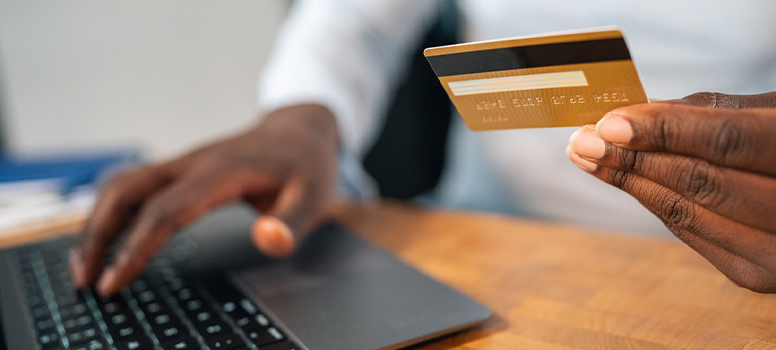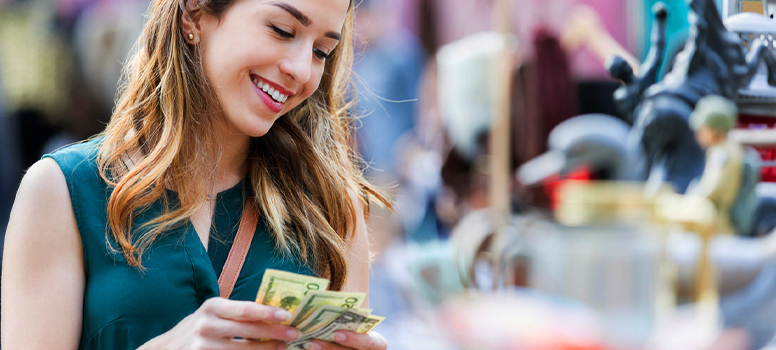Impulse Buying: Why It Happens and 9 Smart Ways to Curb It
Impulse buying. Most of us are familiar. You’re scrolling through social media searching for cat videos and you get completely sidetracked by a “My Cat for President” t-shirt, a blanket with sleeves, or [insert your own particular weakness here], and you just can’t resist!
You were never aware of the tragic sleeved-blanketlessness of your existence before, but it’s suddenly all too clear. You NEED that thing.
The truth is, you’re not alone! According to consumer research, 90% of shoppers have made an impulse purchase within the last 3 months. Some impulse buys are not a problem — you see toilet paper, remember you’re low, and make that necessary purchase. But if you’re making impulse purchases too much, it can be a sign of a larger problem.
Read on to discover what impulse buying is, why it happens, the signs it might be a problem, and how to curb these compulsions.
What is Impulse Buying?
Impulse buying means making a purchase that you didn’t plan ahead of time. An impulse buy could be made online or in-store. It could be a small item like some Skittles from the gas station or something larger, like a $5,000 elliptical machine you spotted on eBay.
Why Does Impulse Buying Happen?

There are a lot of psychological factors that play into an impulse purchase. Some of them are external, meaning they come from the environment surrounding the purchase, and some are internal. The internal factors come from within and relate to our own state of mind, history, and inclinations.
The Idea of Getting a Deal
Impulse buying sometimes occurs because a person feels like they don’t want to miss out on a deal. Sellers play on this feeling by putting a time limit on a sale item or discount and making it seem like it’d be the end of the world if you missed out. Even if someone didn’t particularly need the product or service, this strategy creates a sense of urgency that’s hard to pass by.
Instant Gratification
It can feel really great to make an impulse purchase. This is because gaining something new provides a hit of dopamine — a chemical that makes you feel good — to the brain. There’s always an internal conflict between short term rewards (that dopamine hit) and long term rewards (having more savings), and many times the short term gratification wins out. But if we’re not careful, this wonderful feeling we get from buying things can become an addiction.
External Stimuli
Marketers are experts at knowing how and where to place items so consumers are most likely to buy. Specific smells piped into stores, attractive window displays, background music — all of this is carefully designed stimuli psychologically proven to trigger purchases. Even the way online shopping is curated feeds into this consumer behavior.
Your Own History
It’s possible you picked up impulse buying behaviors from your parents or other influential figures in your life. Or you may never have been instilled with a healthy financial mindset that values saving or being thoughtful in making purchases. This doesn’t mean you should blame your family or your parents. They themselves may be victims of the same cycle of unhealthy spending habits.
Signs that Impulse Buying is Becoming a Problem
If any of these things resonate, it could be a sign that impulse buying is becoming a larger problem:
- You’re shopping when you’re bored.
- You have too many things.
- You buy things to keep up with (or feel more important than) other people.
- Your finances are in trouble.
- You buy things to celebrate.
- You buy things to feel better when you’re sad.
If any of these things sound familiar, check out the next section to learn how to curb your impulse buying.
How to Control Your Impulse Buying
1. Make a Shopping List and Stick To It

Whatever you’re shopping for — groceries, clothes, or anything else — make a list and only purchase the things on that list. Try not to wander the aisles. You’re on a mission! If it helps, make it a game to grab the items you need and get to the cash register as quickly as possible.
2. Don’t Join Email Lists
Email lists tend to be marketing ploys to sell, sell, sell! Don’t set yourself up to fail by exposing yourself to these never-ending sales pitches.
3. Wait 24–48 Hours Before Making a Purchase
Often when you give yourself time to cool off from that initial excitement about something, your enthusiasm for it can diminish. Even if you feel really sure that you want something, give yourself some time for the logic side of your brain to kick in and the dopamine to subside. This will help you to make sure it’s something you really want.
4. Bring an Accountability Shopping Buddy
It can help to go shopping with someone who has your best interests at heart. They may be able to help you put unnecessary things back on the shelf, or their very presence may be reminder enough to stay focused.
5. Budget Some Money For Fun Spending
While it’s unwise to continually make unplanned purchases, you shouldn’t deprive yourself of some retail therapy every now and then if it’s something that truly brings you joy. Also, being overly restrictive with your impulses can force those impulses out in unhealthy ways.
Lay out a budget each month for fun stuff and let that impulsive buyer side out, guided by some boundaries.
6. Limit Your Social Media Intake
Michelle Giordano, a counselor at Live Another Day, an organization that provides addiction recovery resources, says that, “the commercial culture and advertising that frequently promotes the notion that material items will bring happiness or prestige are … factors that contribute to impulsive buying. In order to feel good about themselves, people feel under pressure to buy new goods all the time. This can lead to a cycle of consuming.”
To avoid falling into this trap, keep the time you spend on social media to a minimum. This will help to get rid of the temptation of targeted ads, and it’ll keep you from comparing what you have to what other people have. A “keeping up with the Joneses” mentality will lock you into perpetual disappointment because there’s always going to be someone that has something that you don’t.
7. Avoid Shopping When You’re Emotional
Financial therapist Nathan Astle says that “impulse buying is not an issue of impulse most of the time — it’s an issue of dealing with uncomfortable emotions.” Astle adds that we often buy things because “we are tired, hungry, stressed, sad, frustrated, or overwhelmed, and we don’t know how to regulate those emotions. So if we can start to name those emotions, we can look for what they’re actually telling us we need — a rest, a hug, a self-care break, a conversation with someone, or a cry.”
8. Bring Cash and Leave the Cards Behind

It’s just too easy to swipe a card and forget about the consequences of spending that money. Avoid impulse buying by bringing only the cash you need on shopping trips and leaving your debit and credit cards behind.
9. Remember Your Financial Goals
Do you want to be able to pay off your debt? Purchase a home in a few years? Build up enough savings to retire early? Focusing on these important personal finance goals can help you keep your eye on the prize and recognize that for each unnecessary purchase, it’s further distancing you from your financial dreams.
Final Words
Every once in a while, indulging in a “treat yourself” purchase is totally OK! As long as these indulgences are not too frequent or affecting your financial bottom line, it can even be a healthy outlet.
But if you notice that your impulse spending is getting out of hand, you should start doing something about it. Whether you opt to follow one or more of the tips above, or enlist the help of a mental health professional, it’s important to:
- recognize the problem,
- figure out where it’s coming from,
- and then take the necessary steps to unlearn this behavior.
Future you will thank you for it.
If you’re a Beyond Finance client, you have access to weekly Financial Wellness sessions! These are hosted by Nathan Astle (quoted in this article) and Dr. Erika Rasure, both renowned financial therapists. Click here to register for the next session.
If you’re not a Beyond Finance client but are interested in tackling your debt, click here for a free consultation!
